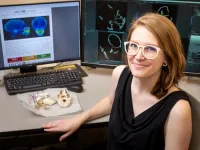(Press-News.org) UC Riverside astrophysicist Stephen Kane had to double check his calculations. He wasn’t sure the planet he was studying could be as extreme as it seemed.
Kane never expected to learn that a planet in this faraway star system is covered with so many active volcanoes that seen from a distance it would take on a fiery, glowing-red hue.
“It was one of those discovery moments that you think, ‘wow, it’s amazing this can actually exist,” Kane said. A paper detailing the discovery has been published in The Astronomical Journal.
Launched in 2018, NASA’s Transiting Exoplanet Survey Satellite, or TESS, searches for exoplanets — planets outside our solar system — that orbit the brightest stars in the sky, including those that could support life.
Kane was studying a star system called HD 104067 about 66 light years away from our sun that was already known to harbor a giant planet. TESS had just discovered signals for a new rocky planet in that system. In gathering data about that planet, he unexpectedly found yet another one, bringing the total number of known planets in the system to three.
The new TESS-discovered planet is a rocky planet like Earth, but 30% larger. However, unlike Earth, it has more in common with Io, Jupiter’s rocky innermost moon and the most volcanically active body in our solar system.
“This is a terrestrial planet that I would describe as Io on steroids,” Kane said. “It’s been forced into a situation where it’s constantly exploding with volcanoes. At optical wavelengths you would be able to see a glowing, red-hot planet with a molten lava surface.”
Kane calculated that the surface temperature of the new planet, TOI-6713.01, would be 2,600 degrees Kelvin, which is hotter than some stars.
Gravitational forces are to blame for the volcanic activity both on Io and on this planet. Io is very close to Jupiter. Kane explained that Jupiter’s other moons force Io into an elliptical or “eccentric” orbit around the planet, which itself has a very strong gravitational pull.
“If the other moons weren’t there, Io would be in a circular orbit around the planet, and it would be quiet on the surface. Instead, Jupiter’s gravity squeezes Io so much that it erupts in volcanoes constantly,” Kane said.
Similarly, there are two planets in the HD 104067 system that are farther away from the star than this new planet. Those outer planets are also forcing the inner rocky planet into an eccentric orbit around the star that squeezes it as it orbits and rotates.
Kane likens this scenario to racquetball, where the small rubber game ball bounces more and gets hotter as it is constantly hit with paddles. This effect is called tidal energy, a term used when referencing one body’s gravitational effect on another body. On Earth, tides are mostly the result of the moon’s gravity dragging our oceans along.
Moving forward, Kane and his colleagues would like to measure the mass of the flaming planet and learn its density. This would tell them how much material is available to blow out of the volcanoes.
Kane said that tidal effects on planets hasn’t historically been a big focus of exoplanet research. Perhaps that will change with this discovery.
“This teaches us a lot about the extremes of how much energy can be pumped into a terrestrial planet, and the consequences of that,” Kane said. “While we know that stars contribute to the heat of a planet, the vast majority of the energy here is tidal and that cannot be ignored.”
END
Squeezed by neighbors, planet glows with molten lava
Extreme conditions on rocky planet surprise scientists
2024-05-09
ELSE PRESS RELEASES FROM THIS DATE:
GPS-like system shows promise as HIV vaccine strategy to elicit critical antibodies
2024-05-09
DURHAM, N.C. – A team led by the Duke Human Vaccine Institute (DHVI) has developed a vaccine approach that works like a GPS, guiding the immune system through the specific steps to make broadly neutralizing antibodies against HIV.
Publishing in the journal Cell Host & Microbe, the study describes an approach that provides step-by-step directions for the immune system to generate the elusive, yet necessary antibodies for a successful HIV vaccine.
“HIV is the fastest-evolving virus known. So it’s been a long-standing goal in HIV research to create ...
NSF awards $630,000 to study teeth of non-human primates
2024-05-09
The National Science Foundation awarded $630,444 to Kathleen Paul, an assistant professor of anthropology at the U of A, to provide a comprehensive outline of dental genetic architecture for two primate species of tamarins and macaques.
Paul's research team’s ultimate goal is to harness this information to advance bioanthropological practice, including the use of teeth for reconstructing evolutionary processes and experiences of stress and illness.
No live animals will be used in the research. Instead, skeletonized individuals from collections ...
Discrimination may accelerate aging
2024-05-09
Discrimination may speed up the biological processes of aging, according to a new study led by researchers at the NYU School of Global Public Health.
The research links interpersonal discrimination to changes at the molecular level, revealing a potential root cause of disparities in aging-related illness and death.
“Experiencing discrimination appears to hasten the process of aging, which may be contributing to disease and early mortality and fueling health disparities,” said Adolfo Cuevas, assistant professor in the Department of Social and Behavioral Sciences at NYU’s ...
New machine learning algorithm promises advances in computing
2024-05-09
COLUMBUS, Ohio – Systems controlled by next-generation computing algorithms could give rise to better and more efficient machine learning products, a new study suggests.
Using machine learning tools to create a digital twin, or a virtual copy, of an electronic circuit that exhibits chaotic behavior, researchers found that they were successful at predicting how it would behave and using that information to control it.
Many everyday devices, like thermostats and cruise control, utilize linear controllers – which use ...
How climate change will affect malaria transmission
2024-05-09
University of Leeds news release
Embargoed until 1900 BST, 9 May 2024
How climate change will affect malaria transmission
A new model for predicting the effects of climate change on malaria transmission in Africa could lead to more targeted interventions to control the disease according to a new study.
Previous methods have used rainfall totals to indicate the presence of surface water suitable for breeding mosquitoes, but the research led by the University of Leeds used several climatic and hydrological models to include real-world processes of evaporation, infiltration and flow through rivers.
This ...
Presenting a safer, low-cost, and low-energy whole-body magnetic resonance imaging device
2024-05-09
Machine learning enables cheaper and safer low-power magnetic resonance imaging (MRI) without sacrificing accuracy, according to a new study. According to the authors, these advances pave the way for affordable, patient-centric, and deep learning-powered ultra-low-field (ULF) MRI scanners, addressing unmet clinical needs in diverse healthcare settings worldwide. Magnetic Resonance Imaging (MRI) has revolutionized healthcare, offering noninvasive and radiation-free imaging. It holds immense promise for advancing medical diagnoses through artificial intelligence. However, despite its five decades of development, MRI remains largely inaccessible, particularly ...
Climate models predict larger than expected decline in African malaria transmission areas
2024-05-09
Areas at risk for malaria transmission in Africa may decline more than previously expected because of climate change in the 21st century, suggests an ensemble of environmental and hydrologic models. The combined models predicted that the total area of suitable malaria transmission will start to decline in Africa after 2025 through 2100, including in West Africa and as far east as South Sudan. The new study’s approach captures hydrologic features that are typically missed with standard predictive models of malaria transmission, offering a more nuanced view that could inform malaria control efforts in a warming world. Most of the burden of malaria falls on people living ...
Indian ocean temperature anomalies predict global dengue trends
2024-05-09
Sea surface temperature anomalies in the Indian Ocean predict the magnitude of global dengue epidemics, according to a new study. The findings suggest that the climate indicator could enhance the forecasting and planning for outbreak responses. Dengue – a mosquito-borne flavivirus disease – affects nearly half the world’s population. Currently, there are no specific drugs or vaccines for the disease, and outbreaks can have serious public health and economic impacts. As a result, the ability to predict the risk of outbreaks and prepare accordingly is crucial for many regions where ...
Cubic millimeter fragment of human brain reconstructed at nanoscale resolution
2024-05-09
Using more than 1.4 petabytes of electron microscopy (EM) imaging data, researchers have generated a nanoscale-resolution reconstruction of a millimeter-scale fragment of human cerebral cortex, providing an unprecedented view into the structural organization of brain tissue at the supracellular, cellular, and subcellular levels. The human brain is a vastly complex organ and, to date, little is known about its cellular microstructure, including the synaptic and neural circuits it supports. Disruption of these circuits is known to play a role in myriad brain disorders. Yet studying human brain ...
What makes a public health campaign successful?
2024-05-09
The highest performing countries across public health outcomes share many drivers that contribute to their success. That’s the conclusion of a new study published May 9 in the open-access journal PLOS Global Public Health by Dr. Nadia Akseer, an Epidemiologist-Biostatistician at Johns Hopkins Bloomberg School of Public Health and co-author of the study and colleagues in the Exemplars in Global Health (EGH) program.
In recent years, the EGH program has begun to identify and study positive outliers when it comes to global health programs around the world, with an aim of uncovering not only which health interventions work, ...
LAST 30 PRESS RELEASES:
Kidney cancer study finds belzutifan plus pembrolizumab post-surgery helps patients at high risk for relapse stay cancer-free longer
Alkali cation effects in electrochemical carbon dioxide reduction
Test platforms for charging wireless cars now fit on a bench
$3 million NIH grant funds national study of Medicare Advantage’s benefit expansion into social supports
Amplified Sciences achieves CAP accreditation for cutting-edge diagnostic lab
Fred Hutch announces 12 recipients of the annual Harold M. Weintraub Graduate Student Award
Native forest litter helps rebuild soil life in post-mining landscapes
Mountain soils in arid regions may emit more greenhouse gas as climate shifts, new study finds
Pairing biochar with other soil amendments could unlock stronger gains in soil health
Why do we get a skip in our step when we’re happy? Thank dopamine
UC Irvine scientists uncover cellular mechanism behind muscle repair
Platform to map living brain noninvasively takes next big step
Stress-testing the Cascadia Subduction Zone reveals variability that could impact how earthquakes spread
We may be underestimating the true carbon cost of northern wildfires
Blood test predicts which bladder cancer patients may safely skip surgery
Kennesaw State's Vijay Anand honored as National Academy of Inventors Senior Member
Recovery from whaling reveals the role of age in Humpback reproduction
Can the canny tick help prevent disease like MS and cancer?
Newcomer children show lower rates of emergency department use for non‑urgent conditions, study finds
Cognitive and neuropsychiatric function in former American football players
From trash to climate tech: rubber gloves find new life as carbon capturers materials
A step towards needed treatments for hantaviruses in new molecular map
Boys are more motivated, while girls are more compassionate?
Study identifies opposing roles for IL6 and IL6R in long-term mortality
AI accurately spots medical disorder from privacy-conscious hand images
Transient Pauli blocking for broadband ultrafast optical switching
Political polarization can spur CO2 emissions, stymie climate action
Researchers develop new strategy for improving inverted perovskite solar cells
Yes! The role of YAP and CTGF as potential therapeutic targets for preventing severe liver disease
Pancreatic cancer may begin hiding from the immune system earlier than we thought
[Press-News.org] Squeezed by neighbors, planet glows with molten lavaExtreme conditions on rocky planet surprise scientists


